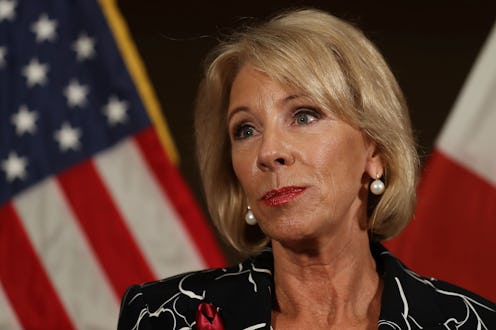News
7 Sexual Assault Statistics Betsy DeVos Needs To See After That ’60 Minutes’ Interview

Betsy DeVos made waves in September when she rolled back protections for sexual assault survivors on college campuses. The U.S. education secretary repeated her belief that students falsely accused of rape weren't treated fairly under the previous guidelines in a 60 Minutes interview that aired over the weekend, saying she doesn't know if the number of false accusations was as high as the number of sexual assaults on campus. To clear up the issue, DeVos could study these seven sexual assault statistics that show young women are way more likely to not report an assault at all than to make one up.
When CBS' Lesley Stahl asked DeVos if she was in fact suggesting the number of sexual assaults and false accusations are equal, the education secretary responded, "Well, one sexual assault is one too many, and one falsely accused individual is one too many." Stahl pushed further, and DeVos acknowledged that she didn't know if the statistics were the same. "But I’m committed to a process that’s fair for everyone involved," she said.
DeVos' new guidance for how universities should handle sexual assault cases raised the standard of evidence required for a school to discipline the accused; eliminated the requirement that schools address sexual assault reports within 60 days; and allowed mediation sessions between the accuser and the accused. While many schools are sticking to the Obama-era practices, advocates for sexual assault survivors say the Trump administration is allowing universities to get by without protecting survivors' rights.
Since DeVos, by her own admission, made those changes without knowing whether there was any evidence that false reporting is as common as sexual assault, here are some statistics she might want to brush up on.
There Are More Sexual Assaults Than Other Violent Crimes In The U.S. Each Year
More than 5 million sexual assaults take place in the United States each year, according to the Justice Department. That means each year, there are more than a million more sexual assaults than other violent crimes, including robberies and nonsexual assaults.
Women In College Are At The Greatest Risk
People between the ages of 18 and 34 are at the highest risk of sexual assault, according to the Rape, Abuse & Incest National Network (RAINN)'s website. Women of all ages experience sexual assault at higher rates than men, and women in college face three times the risk compared to all U.S. women.
At Least 23 Percent Of Women In College Are Sexually Assaulted
A 2015 Association of American Universities study found that 23 percent of undergraduate women and 5 percent of undergraduate men experience sexual assault through physical force, threats of physical force, or incapacitation.
Just 20 Percent Of Student Survivors Report Their Assaults To The Police
When women in college between the ages of 18 and 24 are assaulted, just 20 percent of them report the crime to the authorities, according to the Bureau of Justice's 2014 National Crime Victimization Survey (NCVS). The NCVS did not collect data on what percentage of those women reported an assault to school authorities, but found that just four percent of those who didn't report their assault to the police reported it elsewhere.
Women in the same age range who aren't in college report at a higher rate. According to the same NCVS study, 32 percent of non-student survivors go to the police.
Less Than A Third Of Students Report Sexual Assault To Their School
While most survivors don't report their assault to the police, there are sometimes other options for reporting a crime. For students, one possibility is reporting to university staff. However, the Association of American Universities study found that 28 percent or less of student survivors tell either law enforcement or school authorities they've been assaulted. This means that less than a third of sexual assaults on campus are reported to anyone.
A Chunk Of Young Women Don't Report Because They Don't Want To Get Anyone In Trouble
Of the 80 percent of young women who don't report to the police, the NCVS found that 10 percent didn't want to get the accused in trouble. While DeVos suggested in the 60 Minutes interview that women often falsely report assaults, this data shows the opposite: that many young women actually are concerned about causing harm to the person who assaulted them.
False Reports Make Up 10 Percent Or Less Of All Sexual Assault Reports
While studies on the frequency of false sexual assault reports aren't comprehensive, research suggests that rate is very low. The National Sexual Violence Resource Center compiled multiple studies on the subject and concluded that "the prevalence of false reporting is between 2 percent and 10 percent."
Though DeVos said she was unsure of the facts, these statistics show it's not common for student survivors to falsely report rape. It is a glaring problem, however, that studies find more than two thirds of students don't feel safe or comfortable reporting real sexual assaults.